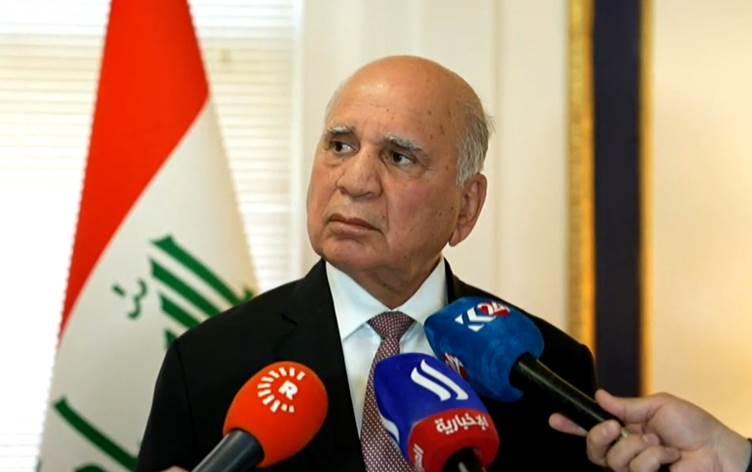Iraqi FM: We Are Committed to Bridging Differences and Resuming Kurdistan’s Oil Exports
Hussein revealed that the Kurdistan oil dossier was part of his U.S. discussions and also featured in separate virtual meetings with two of the international companies currently operating in the Region.

By Ahora Qadi
Erbil (Kurdistan 24) – Iraqi Foreign Minister and Deputy Prime Minister Fuad Hussein confirmed on Tuesday that Baghdad is making serious efforts to bridge the gap between all relevant parties in order to resume the export of oil from the Kurdistan Region, a critical file that remains unresolved amid ongoing talks.
Speaking in a press conference attended by Kurdistan 24 following his return from the United States, Hussein described his visit as “successful and exceptional,” highlighting his engagements with senior American officials, including Secretary of State Marco Rubio and other U.S. official.
Kurdistan Oil Exports: A Core Priority
Hussein revealed that the Kurdistan oil dossier was part of his U.S. discussions and also featured in separate virtual meetings with two of the international companies currently operating in the Region.
“I had the opportunity to hear directly from the two companies involved in Kurdistan about their perspective on the ongoing negotiations in Baghdad,” Hussein said. “I’m also fully aware of the position of the Kurdistan Regional Government (KRG), especially after my extensive talks with Prime Minister Masrour Barzani. As a representative of the federal government, I also understand Baghdad’s position intimately.”
He emphasized the need to find a balanced resolution, adding, “Upon my return, we will exert every effort to bring the views of the three sides closer and resume oil exports from the Kurdistan Region.”
U.S.-Iraq Strategic Dialogue and Regional Stability
Hussein also discussed plans to revitalize the U.S.-Iraq strategic dialogue, which he said could be relaunched in Washington within two months.
“Our visit was coordinated with the U.S. State Department and Foreign Secretary Rubio himself,” he explained. “We expect to hold a new round of strategic dialogue sessions, aiming to activate and enhance all levels of cooperation between Baghdad and Washington.”
Security matters were high on the agenda, particularly Iraq’s internal stability and regional threats. “Iraq is currently experiencing stability,” Hussein noted. “However, the real risk stems from the surrounding regional environment, not Iraq itself.”
He pointed to continuing regional tensions and urged sustained American support to shield Iraq from the dangers of regional conflict. “We discussed the need for protection and support to preserve Iraqi society and ensure that Iraq remains distant from the flames of war.”
U.S.-Iran Talks and the Baghdad Summit
On the topic of U.S.-Iran negotiations, Hussein said he remains in communication with diplomats in Tehran and Muscat, Oman, the latter of which is mediating the talks.
He also highlighted preparations for the upcoming Baghdad Summit, scheduled for May 17, which will bring together Arab leaders for key discussions amid shifting regional dynamics. “Security conditions in the region today are vastly different from two years ago,” Hussein stated. “This summit will reflect those changes and address new challenges accordingly.”
Diplomatic Engagements with Clear Objectives
Reflecting on his various meetings, Hussein said each U.S. department prioritized different topics—from security and economic affairs to Syria and sanctions. “The State Department focused on bilateral relations, political and economic matters. Meanwhile, our discussions with the Treasury dealt with distinct financial issues,” he explained.
Overall, the minister reaffirmed Iraq’s commitment to strengthening its partnerships and navigating sensitive issues—such as the Kurdistan oil file and regional threats—through diplomatic coordination and open dialogue.
“We are determined to reactivate and build upon all existing relationships between Washington and Baghdad,” he concluded.